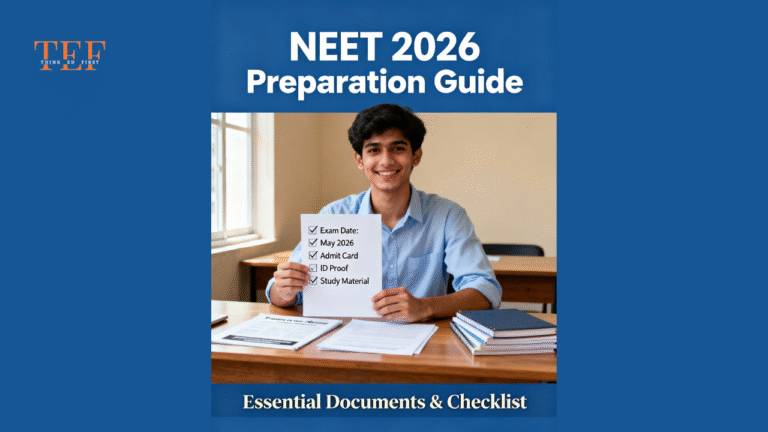Have you ever wondered how top performers manage to stay sharp during long, intense tests? The answer lies in a combination of preparation and proven techniques. In this guide, we’ll explore how to maintain focus and maximize your performance during the 3-hour NEET exam.
Success isn’t just about hard work—it’s about working smart. Drawing insights from top achievers and coaching experts, we’ve compiled strategies to help you stay on track. From managing your time effectively to adopting mindfulness practices, these methods can make a significant difference.
Our goal is to provide you with actionable tips and a personalized approach to your preparation. Let’s work together to turn challenges into opportunities and achieve the results you deserve.
Introduction
Achieving success in competitive exams requires more than just knowledge—it demands focus. The ability to stay sharp and composed during a high-pressure test can significantly influence your performance. In this section, we’ll explore why focus matters and how it can help you tackle the unique challenges of the exam.
Why Focus Matters in the NEET Exam
Focus is the foundation of effective preparation. With 180 questions to answer in just 3 hours, every second counts. A clear mind allows you to process information quickly and accurately, reducing errors and maximizing your score. Without focus, even the most prepared students can struggle under pressure.
Studies show that students who practice mindfulness and strategic planning perform better. By honing your focus, you can approach each question with confidence and clarity, ensuring you make the most of your preparation.
Overview of Exam Challenges and Goals
The exam presents several challenges, including a vast syllabus and strict time limits. Students must master diverse topics, from Physics to Biology, while managing their time effectively. Understanding these challenges is the first step toward creating a winning strategy.
Setting clear goals is equally important. Beyond aiming for high marks, think about how this exam aligns with your long-term career aspirations. A focused mindset helps you stay motivated and committed to your preparation.
| Exam Feature | Details |
|---|---|
| Total Questions | 180 |
| Duration | 3 hours |
| Marking Scheme | +4 for correct, -1 for incorrect |
| Primary Resource | NCERT textbooks |
By understanding the exam’s structure and challenges, you can tailor your study habits to meet its demands. Focused preparation not only boosts your performance but also builds the resilience needed for a successful medical career.
Understanding the NEET Exam Structure
Understanding the structure of a test is the first step toward mastering it. For the NEET exam, this means breaking down its format, syllabus, and question pattern. A clear grasp of these elements helps you align your study habits effectively.
Exam Pattern and Syllabus Breakdown
The exam consists of 180 multiple-choice questions, divided into three sections: Physics, Chemistry, and Biology. Each correct answer awards 4 points, while an incorrect one deducts 1 point. This scoring system emphasizes accuracy and careful answering.
Physics, Chemistry, and Biology are the core subjects, with Biology carrying the highest weightage. The syllabus is vast, but NCERT textbooks serve as the primary resource. Around 80-90% of questions are derived from these books, making them indispensable for preparation.
To succeed, it’s essential to focus on key topics and practice regularly. Mock tests are a great way to simulate the exam environment and improve time management. By understanding the exam blueprint, you can plan your revision strategically and approach the test with confidence.
Setting a Focused Mindset for NEET Preparation
Building a strong mindset is the cornerstone of achieving success in any high-pressure situation. A positive and focused approach helps you stay calm, think clearly, and perform at your best. Let’s explore how to cultivate this mindset and overcome challenges effectively.
Overcoming Anxiety
Anxiety can hinder your performance, but there are proven techniques to manage it. Start by practicing mindfulness, such as deep breathing or meditation. These methods help calm your nerves and improve focus.
Another effective strategy is visualization. Imagine yourself succeeding and staying composed during the test. This mental rehearsal can boost your confidence and reduce stress.
Lastly, maintain a balanced routine. Regular exercise and adequate sleep are essential for mental well-being. A healthy body supports a focused mind.
Building Confidence Through Preparation
Confidence comes from consistent preparation. Create a realistic schedule that covers all topics while allowing time for revision. Stick to this plan to build momentum and reduce last-minute stress.
Set specific, measurable goals for each study session. This approach keeps you motivated and ensures steady progress. Celebrate small wins to stay encouraged.
Practice regularly with mock tests. They simulate the actual environment and help you identify areas for improvement. Consistent practice builds both knowledge and confidence.
| Technique | Benefit |
|---|---|
| Mindfulness | Reduces stress and improves focus |
| Visualization | Boosts confidence and mental clarity |
| Balanced Routine | Supports overall well-being |
| Mock Tests | Enhances time management and accuracy |
By adopting these strategies, you can develop a focused mindset that drives positive results. Remember, preparation is not just about hard work—it’s about working smart and staying resilient.
Effective NEET Exam Concentration Tips
Staying sharp during a long test requires more than just knowledge—it’s about strategy and focus. We’ve gathered proven techniques from top performers and coaching experts to help you maintain clarity and composure throughout the examination.
Advice from Top Aspirants
Top performers emphasize the importance of time management. Break your study sessions into focused intervals, like the Pomodoro Technique, which suggests 25 minutes of work followed by a 5-minute break. This method keeps your mind fresh and prevents burnout.
Another key tip is to align your revision with the syllabus. Covering every section ensures you’re well-prepared and reduces last-minute stress. Regular practice with mock tests also helps you get familiar with the test format and improves accuracy.
Expert Strategies to Enhance Focus
Experts recommend incorporating mindfulness practices into your routine. Simple techniques like deep breathing or meditation can calm your nerves and improve concentration. Visualization is another powerful tool—imagine yourself succeeding to boost confidence.
During the test, manage your time wisely. Allocate specific minutes to each section and stick to the plan. If you’re stuck on a question, move on and return to it later. This approach ensures you maximize your score within the limited hour.
- Use the Pomodoro Technique to study in focused intervals.
- Align your revision plan with the syllabus for comprehensive preparation.
- Practice mindfulness to reduce stress and improve focus.
- Manage your time effectively during the test to answer all questions.
By following these strategies month after month, you’ll build the discipline and focus needed to excel. Remember, success is not just about hard work—it’s about working smart and staying resilient.
Designing a Custom Study Timetable for Focused Revision
Creating a personalized study plan is the key to staying organized and focused during your preparation. A well-structured timetable helps you cover the entire NEET syllabus efficiently while balancing subjects like chemistry, biology, and physics. Let’s explore how to craft a schedule that works for you.
Steps to Craft an Efficient Schedule
Start by reviewing the syllabus and past papers to identify key topics. Allocate more time to subjects or areas where you need improvement. For example, if chemistry is challenging, dedicate extra hours to mastering it.
Break your study sessions into manageable blocks. Use techniques like the Pomodoro method—25 minutes of focused study followed by a 5-minute break. This keeps your mind fresh and prevents burnout.
- Align your timetable with the NEET syllabus to ensure comprehensive coverage.
- Include regular practice sessions with mock tests to simulate the actual exam environment.
- Review eligibility requirements to ensure your preparation aligns with the exam’s expectations.
Monitor your progress weekly and adjust the schedule as needed. Flexibility is crucial to address weak spots and reinforce strong areas. For more insights on time management for NEET, explore our detailed guide.
Finally, use tools like digital planners or handwritten schedules to stay organized. A structured approach minimizes stress and maximizes productivity, helping you stay on track toward your goals.
Utilizing Quality Study Material for NEET Success
The right study materials can make or break your preparation journey. High-quality resources not only simplify complex topics but also align with the exam’s structure and demands. Choosing wisely ensures you cover the syllabus effectively and build a strong foundation for success.
Selecting the Best Prep Resources
Start by identifying materials that match the exam’s pattern. Look for resources that break down topics into manageable sections, making it easier to grasp concepts. Coaching institutes often recommend books that focus on key areas like biology, ensuring comprehensive coverage.
Supplement your primary resources with practice papers and mock tests. These tools help you understand the question format and improve accuracy. Regular revision of your notes is equally important to reinforce learning and retain information.
The Role of NCERT Textbooks and Reference Guides
NCERT textbooks are indispensable for preparation. They align closely with the syllabus and are trusted by top performers. Use them as your primary resource, especially for biology, which carries significant weight in the exam.
Reference guides can provide additional insights and practice questions. However, balance detailed textbooks with summarized notes for efficient review. This approach saves time and ensures you focus on high-yield topics.
- Choose resources that align with the exam’s pattern and syllabus.
- Prioritize NCERT textbooks for comprehensive coverage.
- Use mock tests and practice papers to improve accuracy.
- Regularly revise your notes to reinforce learning.
By following these strategies, you can optimize your preparation and approach the test with confidence. Remember, quality study materials are the backbone of effective learning.
Integrating Smart Practice with Mock Tests and Past Papers
Smart practice is the bridge between preparation and success in any competitive scenario. By incorporating mock tests and past papers into your daily routine, you can build confidence, improve accuracy, and identify areas for improvement. This approach ensures you’re not just studying hard but studying smart.
Benefits of Regular Mock Tests
Mock tests are a powerful tool for gauging your preparation level. They simulate the actual test environment, helping you manage time and stress effectively. Regular practice also highlights weak areas, allowing you to focus your efforts where they’re needed most.
Taking periodic breaks during practice sessions is equally important. Short pauses refresh your mind, boosting concentration and productivity. This strategy ensures you stay sharp and avoid burnout.
- Plan a mock test schedule that complements your overall study routine.
- Review performance tables to track progress and measure improvement.
- Simulate exam conditions at home to reduce anxiety and build familiarity.
Smart practice is a continuous process. After each test, analyze your performance and adjust your plan accordingly. This feedback loop helps you refine your strategy and reach a higher performance level.
By integrating mock tests and past papers into your preparation, you can solidify your understanding of the syllabus and approach the test with confidence. Remember, success is not just about hard work—it’s about working smart and staying resilient.
Implementing Breaks and Health Strategies to Sustain Focus
Healthy habits are the foundation of sustained focus and productivity. To perform at your best, it’s essential to balance study with self-care. This includes proper sleep, nutrition, and effective breaks. Let’s explore how these strategies can enhance your preparation and overall performance.
Importance of Good Sleep and Nutrition
Sleep plays a critical role in cognitive function and memory retention. Aim for 7-8 hours of quality sleep each night to stay sharp and reduce stress. A well-rested mind processes information more efficiently, helping you retain what you’ve learned.
Nutrition is equally important. A balanced diet rich in fruits, vegetables, and lean proteins provides sustained energy. Avoid excessive caffeine and sugary snacks, which can lead to energy crashes. Good eating habits support both physical and mental well-being.
Effective Techniques for Timed Breaks
Taking regular breaks is essential for maintaining focus. Studies show that short pauses during study sessions improve information retention. For example, try the 50/10 rule—study for 50 minutes, then take a 10-minute break.
During breaks, engage in activities that refresh your mind. Stretching, walking, or practicing mindfulness can reduce stress and improve concentration. Understanding the value of breaks helps you use them effectively.
- Prioritize 7-8 hours of sleep each night for optimal cognitive function.
- Maintain a balanced diet to sustain energy levels and focus.
- Incorporate timed breaks into your study routine to prevent burnout.
- Use mindfulness techniques during breaks to reduce stress and improve clarity.
By integrating these health strategies into your daily routine, you can sustain focus and perform at your best. A balanced approach ensures both your mind and body are in optimal condition for success.
Overcoming Weak Spots Through Focused Revision
Identifying and addressing weak areas is crucial for achieving consistent progress in your preparation. Many candidates struggle with specific subjects or topics, but targeted revision can turn these challenges into strengths. Let’s explore proven strategies to help you stay on track and maximize your performance.
Strategies to Strengthen Challenging Subjects
Start by analyzing your performance in mock tests and question papers. These tools highlight areas where you need improvement. For example, if chemistry concepts are challenging, dedicate extra time to revising key topics and practicing related questions.
Incorporate a cycle of continuous learning into your routine. Regularly review your notes and revisit difficult topics to reinforce understanding. This approach ensures you stay confident and prepared for any question that comes your way.
- Use mock test results to identify weak spots and adjust your revision plan accordingly.
- Review previous question papers to understand common patterns and focus areas.
- Break down complex topics into smaller sections for easier comprehension.
- Practice regularly to build confidence and improve accuracy in challenging subjects.
Tailored revision techniques are essential for each subject. For biology, focus on diagrams and conceptual clarity. For physics, emphasize problem-solving and formula application. A personalized approach ensures every candidate’s weaknesses are addressed effectively.
Finally, persistence is key. Regular evaluation and feedback from practice tests help you refine your strategies and stay motivated. By focusing on your weak spots, you can transform them into strengths and achieve your goals.
Conclusion
Success in competitive scenarios hinges on a well-rounded approach to preparation. We’ve explored how a systematic study plan, quality study materials, and consistent practice are essential for every candidate. By integrating these elements, you can build a strong foundation for achieving your goals.
Mock tests and past year question papers play a crucial role in identifying gaps in learning. Regular practice with these resources helps improve accuracy and time management. Tailoring your revision to the syllabus ensures comprehensive coverage and boosts confidence.
Our guide combines practical advice, expert strategies, and actionable tips tailored for every year’s candidate. We encourage you to adopt these integrated strategies to enhance your performance. Remember, a balanced approach to preparation is key to overcoming challenges and securing success.
By following these comprehensive guidelines, you can approach your goals with confidence and clarity. We believe in your potential and are here to support you every step of the way.





